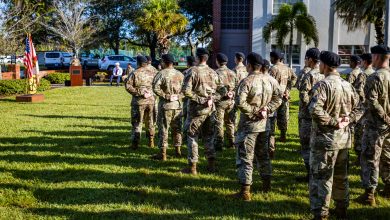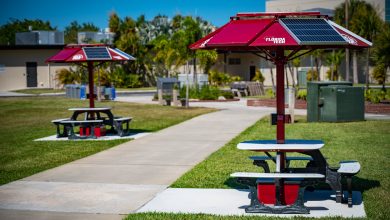Finding another angle of approach to STEM
Allison Lees Heater ’96 earned her M.S. in Ocean Engineering from Florida Tech and is now the scientific liaison onboard the R.V Atlantis for the Shipboard Scientific Services Group at Woods Hole Oceanographic Institution. When she’s not onboard the R/V Atlantis, she enjoys SCUBA diving, snorkeling, bicycling and photography. She also loves a good puzzle and to travel.
Tell us a little bit about yourself?
I earned my degree in Mechanical Engineering from the University of Wisconsin – Madison. My first job was working with a company that sold a software product for sheet metal fabrication (CNC, etc). My job was a mixture of sales (demonstrational), operator training, and troubleshooting.
I left that job to join the Peace Corps, where I served in Botswana, Africa for two years, working for the Botswana Ministry of Education. My main function there was to build a database and write a program to manage it (for handling student records). There is likely no way I can express how much I got out of that experience. I can only hope that I also successfully gave something back.
When I returned from Africa, I enrolled in the Master’s program in Ocean Engineering at the Florida Institute of Technology. I am really glad I selected FIT. The class sizes were reasonably small, which I needed. I also got the opportunity to assist many other graduate students with their thesis research projects (helping with fieldwork), which offered some excellent perspective. I was also invited to join Tau Beta Pi while I was a student at FIT.
Since then, I have primarily been working offshore, first in seismic exploration, and then in academic scientific research (with Harbor Branch, and now with Woods Hole Oceanographic Institution). I did spend three years onshore teaching high school mathematics as well, but being on land just didn’t take.
My job now is with the Shipboard Scientific Services Group (SSSG) at Woods Hole Oceanographic Institution. I work on the ships (primarily the R/V Atlantis) assisting scientists from around the world in collecting data for their research. My job might be best described as doing a little bit of anything and everything that needs to be done. Our SSSG group members act as science liaisons, helping scientists who are usually in lab settings onshore acclimate to life at sea. We also maintain the ship’s computer networks and internet/satellite antennae, as well as maintain, operate, and train science in the use of many different pieces of oceanographic equipment. As a perk, the Atlantis carries the manned submersible Alvin, and we have the opportunity to assist with those operations. So, I get to get in the water on occasion to help deploy and recover the submersible, and I also operate the A-frame (which lifts the sub into the water) during deploy/recover operations.
The job I have is really quite amazing. I am frequently dazzled by the amazing work the scientists are doing. Almost everyone that comes aboard is willing, and even anxious to share information about their research topics and answer questions. Another huge perk with this job is I get to travel and I get a lot of time off (a rotation with the ship is typically 3-4 months working 10-12 hours per day 7 days a week, but once the rotation is over I look forward to 2 months completely off).
What am I passionate about? Destroying our ability to inhabit this planet. I won’t even begin to elaborate, as I might spout on for pages!
What inspired you to pursue a STEM education and career?
I have always been good at math. More than that, I have always enjoyed math, puzzles, and problem solving.
What do think are some of the most shared/common challenges women in STEM fields encounter?
When I did my undergraduate degree, there were only about 4% women in my graduating class. I think those numbers have come up a lot, but I think women are still usually in the minority. There is probably still a lot less encouragement for young girls to pick up tools and build things and participate in other activities that build confidence needed in STEM fields.
As far as the work environment, I think things have steadily improved (at least from my perspective). I think there are still some misunderstandings between men and women as far as reactions, in the work place. This is a very vast generalization that certainly does not apply to all people or situations, but men and women often react and handle situations differently. For example, I can remember a time when I was speaking with a former boss (male) about something that angered and frustrated me. I was fighting the tears, but eventually they were rolling down my cheeks. My boss interpreted this as I was feeling weak and defeated, when I was actually feeling righteously angry. I don’t know if many women cry when they are mad, but I think it is something men do not generally do. It is difficult to explain one’s true emotions to someone who is interpreting the body language to mean something entirely different.
I think there is still also a tendency for women to feel a stronger need to prove themselves than the average man in STEM. That may be partially “self-inflicted”, but I am sure a lot of women still have experiences that lead them to feel that way.
How have you overcome obstacles/challenges as a woman in STEM?
Over time, I have learned to trust my instincts. Sometimes, things are worth standing up and fighting for, other times, maybe not. If I feel like I can make a difference, I will try.
Knowing what you know now, what advice you would give your younger self?
I would tell myself to trust my gut feelings more than I did. Certainly, if you are getting a negative feeling about a job or person you work with, test that feeling. Don’t just jump to conclusions. But, those feelings are sometimes there to protect us, so don’t dismiss them outright either.
What one takeaway would you want to impart on a young woman thinking of pursuing an education/career in STEM?
You can do it. There has been a lot of research on the brain that indicates that people’s brains are wired (organized) differently. There will be times that you will go into a class and feel completely overwhelmed. It could just be that your learning style is different. Don’t give up. Find another angle of approach.
In your experience, what are the top things leaders could do to encourage more young women to enter STEM fields?
I can name what I think are some problems, but I’m not sure I have good solutions for any of them.
I can tell you that when I was teaching high school many of the students, male and female, came into the classroom already disliking math. It seemed like many of them had the odd idea that math was magical rather than logical. They didn’t seem to realize there were actual steps they could follow that would work every time.
Also, if a young woman entering college knows that if she graduates in engineering she is highly likely going to make less money than a man with the same degree, how is she supposed to perceive that?





